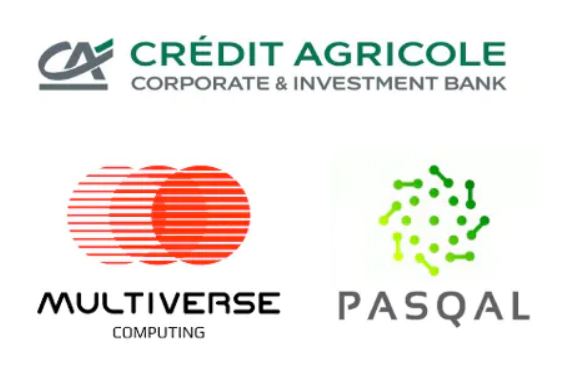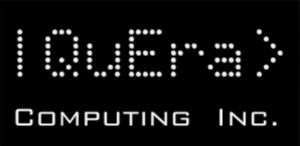 Paris, 26 January 2023 – Crédit Agricole CIB and European quantum companies Pasqal and Multiverse Computing have announced results on two quantum computing proofs of concept.
Paris, 26 January 2023 – Crédit Agricole CIB and European quantum companies Pasqal and Multiverse Computing have announced results on two quantum computing proofs of concept.
These two experiments, initiated in June 2021 by Crédit Agricole, aimed to evaluate the contribution of an algorithmic approach inspired by quantum computing, and the potential of quantum computers, in the valuation of financial products and the assessment of credit risks.
The goal of the first experiment — valuation of derivatives in capital markets with Multiverse — was to assess the performance gain offered by quantum computing. Recent research has shown the benefit of neural networks for this type of calculation. Yet, in several cases, these neural networks are difficult to use because they are too memory resource intensive and suffer from lengthy processing times, according to the companies.
However, they said, algorithmic techniques inspired by quantum computing can be used to optimize the speed and memory required for this training phase, leading to faster valuations and more accurate risk assessments.
For the other experiment, the anticipated downgrade of counterparties’ financial rating with Pasqal and Multiverse — there was a twofold goal, : to measure a quantum computer’s ability to solve a concrete problem, given the current state of technology; and to assess the change in performance depending on the number of qubits used.
The bank chose a production use case providing a real point of comparison: the anticipation of a counterparty credit rating downgrade over a six- to 15-month period. Good results can be achieved using conventional computing and heuristics, the companies said, but these methods do not work for all problems and there is no guarantee the results will be close to the ideal solution. Using quantum parallelism, in theory, makes it possible to find optimum solutions more efficiently.
The two experiments took place over a year. The companies said using quantum techniques resulted in a marked improvement in computing time, requiring a smaller memory footprint. They said this paves the way for quantum’s use in real-world derivative valuation applications.
“With a quantum processor of only 50 qubits, the results obtained are as accurate as the results in production,” the companies said in their announcement. “Our projections indicate that this performance could be bettered at 300 qubits, a power that should be available industrially in 2024.1”
“These two proofs of concept demonstrated the potential and reality of quantum computing for finance, despite these technologies still being in their infancy,” said Ali El Hamidi, the project’s sponsor at Crédit Agricole CIB. “We took advantage of this initiative to start developing the internal skills to prepare for a technological breakthrough which, if it happens, will have a direct and decisive impact on competitiveness in our sector.”
Georges-Olivier Reymond, President of Pasqal, said: “This is the most instructive experiment carried out in the industry so far, offering concrete comparisons for the first time, launching a new era for quantum computing. One of the results is that the tipping point is not that far away, probably less than two years, and that it is therefore urgent for users to quickly adopt these new methods, as Crédit Agricole CIB has done.”
1 See [2212.03223] Financial Risk Management on a Neutral Atom Quantum Processor (arxiv.org)
[2208.02235] Quantum-Inspired Tensor Neural Networks for Partial Differential Equations (arxiv.org) and [2212.14076] Quantum-Inspired Tensor Neural Networks for Option Pricing (arxiv.org)
- SEO Powered Content & PR Distribution. Get Amplified Today.
- Platoblockchain. Web3 Metaverse Intelligence. Knowledge Amplified. Access Here.
- Source: https://insidehpc.com/2023/01/credit-agricole-announces-quantum-poc-results-with-pasqal-and-multiverse-computing/
- 2021
- 2023
- 2024
- a
- ability
- According
- accurate
- achieved
- adopt
- ADvantage
- algorithmic
- All
- and
- announced
- Announcement
- Announces
- Anticipated
- anticipation
- applications
- approach
- assessment
- assessments
- atom
- available
- Bank
- because
- being
- benefit
- breakthrough
- capital
- Capital Markets
- case
- cases
- change
- chose
- Close
- Companies
- comparison
- competitiveness
- computers
- computing
- concept
- contribution
- conventional
- could
- Counterparty
- credit
- credit rating
- Current
- Current state
- decisive
- demonstrated
- Depending
- Derivatives
- Despite
- developing
- difficult
- direct
- Downgrade
- efficiently
- Era
- European
- evaluate
- experiment
- faster
- finance
- financial
- financial products
- Find
- First
- first time
- Footprint
- from
- Gain
- given
- goal
- good
- guarantee
- happens
- HTTPS
- ideal
- Impact
- improvement
- in
- indicate
- industry
- Initiative
- inspired
- internal
- IT
- January
- launching
- leading
- MAKES
- management
- marked
- Markets
- max-width
- measure
- Memory
- methods
- more
- most
- Multiverse
- Multiverse Computing
- networks
- neural networks
- Neutral
- New
- number
- obtained
- offered
- offering
- ONE
- Optimize
- optimum
- Option
- Other
- Pasqal
- performance
- period
- phase
- Place
- plato
- Plato Data Intelligence
- PlatoData
- PoC
- Point
- possible
- potential
- power
- Prepare
- president
- probably
- Problem
- problems
- processing
- Processor
- Production
- Products
- projections
- projects
- proofs
- providing
- Quantum
- quantum computers
- quantum computing
- qubits
- quickly
- rating
- real
- real world
- Reality
- recent
- required
- research
- resource
- Results
- Risk
- risk management
- risks
- Said
- sector
- several
- should
- shown
- skills
- smaller
- So
- so Far
- solution
- Solutions
- SOLVE
- speed
- sponsor
- start
- State
- Still
- techniques
- technological
- Technologies
- Technology
- The
- their
- therefore
- time
- times
- Tipping point
- to
- too
- Training
- urgent
- use
- use case
- users
- Valuation
- Valuations
- which
- will
- Work
- year
- years
- zephyrnet











